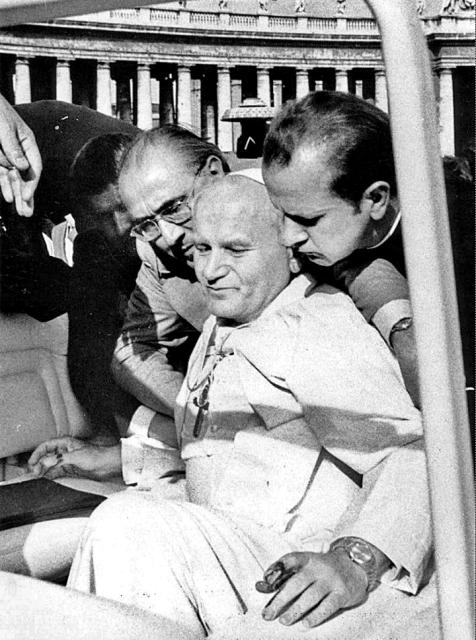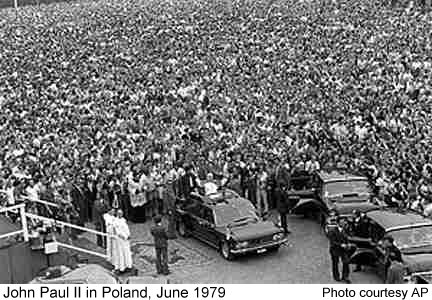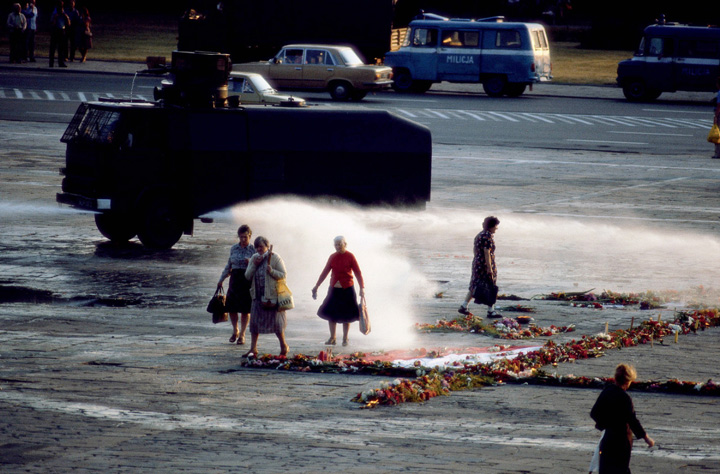|
|
Post by Bonobo on Apr 2, 2009 21:35:58 GMT 1
The 4th anniversary of JPII`s death.  www.tvn24.pl/-1 www.tvn24.pl/-1,1593886,0,1,2137-cztery-lata-pozniej,wiadomosc.html |
|
|
|
Post by jeanne on Apr 3, 2009 22:56:20 GMT 1
The 4th anniversary of JPII`s death.  www.tvn24.pl/-1 www.tvn24.pl/-1,1593886,0,1,2137-cztery-lata-pozniej,wiadomosc.html Thanks for the reminder. |
|
|
|
Post by Bonobo on Apr 4, 2009 20:45:36 GMT 1
Kremlin involved in Papal shooting?
The Warsaw Business Journal
31st March 2009CIA files reveal that Soviet influence was behind the shooting of Pope John Paul II in 1981
A declassified CIA document obtained by Polska has shed light on the near fatal 1981 shooting of Pope John Paul II in Rome.
It was originally believed that the shooter, Ali Agca, was a member of the Turkish Grey Wolves, an extremist right wing political organization. However, the 39-page document, drafted by the CIA in 1985, revealed that the Soviet KGB might have been involved in preparing Agca for the shooting, according to Polska.
"This is an extremely important document," Marek Lasota, an IPN historian, told Polska. He added that this report proves that the Kremlin was directly involved in the 1981 attack.
The Polish John Paul II is considered one of the most important players in bringing down communism in Central and Eastern Europe.
        
|
|
tomek
Nursery kid
 
Posts: 256 
|
Post by tomek on Apr 7, 2009 10:39:09 GMT 1
Wish to know more. What hurt John Paul? Any bullits hit he? Was it possible die for John P?
|
|
|
|
Post by Bonobo on Apr 7, 2009 21:00:36 GMT 1
Wish to know more. What hurt John Paul? Any bullits hit he? Was it possible die for John P? There was danger of fatality. I remember he was shot with two bullets , and one hit the stomach or its area. If not for a quick operation, who knows what could have happened. |
|
|
|
Post by Bonobo on Apr 19, 2009 20:40:52 GMT 1
|
|
|
|
Post by jeanne on Apr 19, 2009 23:34:48 GMT 1
Bonobo,
Just out of curiosity...you were a child during the last years that JPII was still in Krakow...did you ever have any kind of contact with him? Did you see him in person, attend a Mass he said, etc. during those years?
|
|
|
|
Post by tufta on Apr 21, 2009 18:58:10 GMT 1
Bonobo, Just out of curiosity...you were a child during the last years that JPII was still in Krakow...did you ever have any kind of contact with him? Did you see him in person, attend a Mass he said, etc. during those years? Jeanne, I have seen JPII twice. One from a distance of some 200 meters and once he passed by just 3 meters below me. I was sitting on a tree standing along the route from Warsaw airport to city centre...  Oh ,good old times... But I know a couple of people who did talk with JPII in person. I find it hard to get into details but they report they were touched so deeply that it exceeded all other human interactions they had. |
|
|
|
Post by Bonobo on Apr 21, 2009 22:52:41 GMT 1
Bonobo, Just out of curiosity...you were a child during the last years that JPII was still in Krakow...did you ever have any kind of contact with him? Did you see him in person, attend a Mass he said, etc. during those years? I hadn`t had any contact with him before 1978. Our mother prefered to stay away from the church a bit at the time, we went to masses and religion classes but only locally, we didn`t go to Wawel or city centre churches where Wojtyla preached. Actually, I saw and heard him many times during his visits to Poland. I didn`t climb the tree to see him in 1979, I was standing on the balcony or in the crowd in Błonia. Later on, in highschool in 1983, part of our class jumped out of the window on the ground floor and went to Kuria where the Pope was to stay. The door had been locked by our communist headmaster who tried to prevent students from welcoming JP. Actually, he officially forbade anybody leave school. Fortunately, we came back unnoticed by the headmaster and teachers whose lessons we missed were lenient.  Pope John Paul II was greeted by throngs of crowds on his first trip back to his native Poland as Pope - June 6, 1979 (Photo: Time Magazine) Pope John Paul II was greeted by throngs of crowds on his first trip back to his native Poland as Pope - June 6, 1979 (Photo: Time Magazine)
June 2-10, 2009 marks the 30th anniversary of Pope John Paul II’s historic nine day visit to Poland in June of 1979. It was the Holy Father’s first visit to his homeland since his election to the Papacy, just eight months earlier.
John Paul II biographer George Weigel describes these nine days as the pivot upon which the entire 20th Century turned. It is an extraordinary claim, yet a claim well supported by what transpired in the years after Karol Woytila’s triumphal return to Poland in June of 1979 as Pope John Paul II. In a new documentary, Speaker Newt Gingrich and his wife Callista explore this claim. The documentary is expected to be released in Fall 2009.
The Polish trade union movement had languished for years prior to June 1979, attracting only a modest amount of popular support. Sixteen months after John Paul II’s nine days in Poland in June 1979, and following the August 1980 Gdansk shipyard strike, the Solidarity trade union movement became the first officially recognized free trade union in the Communist bloc with over 10 million members.
What transpired during these nine days in June 1979 that so moved a nation to begin to free itself of its communist shackles? Why did millions of Pole – almost [one third] of the entire nation – come out to see the Pope during his several public appearances? What was the nature of the communist system in Poland that made the Pope’s visit a liberation event?
Nine Days that Changed the World will present the Pope’s trip to Poland in June 1979 as the cataclysmic event that changed a nation and changed the world. The story of the book and film will begin with Cardinal Woytila’s election to the Papacy in October 1978 and lead to his triumphal return to Poland on June 2, 1979 and his first public Mass before millions in Warsaw’s Victory Square. During the course of the film it will make brief references to his upbringing, his life under first Nazism and the Stalinism, and his vocation to the priesthood.
The film will feature the homilies and remarks he gave during these nine days and the places he went in the context of their special relevance in Polish history.
“Nine Days” will be a story of human liberation. It will reveal how the Pope’s visit helped the Poles find their courage and reclaim their culture. It will express the Pope’s message that after the lies of Nazism and the lies of Communism about the nature of man and the nature of freedom, that authentic human freedom is only possible through the truth of Jesus Christ. Nine Days will reveal the extraordinary power that this message had to inspire a revolution of conscience that changed a nation and a world.
Nine Days is meant to inspire and educate those who view it to understand the nature of freedom, to live in the truth, and to recognize that there is evil in the world that, with God’s help, must and can be defeated. www.ninedaysthatchangedtheworld.com/
The Election of the Polish Pope and his visit to Poland in June 1979..
On October 16, 1978, Cardinal Karol Wojtyla (b. 1920), Archbishop of Krakow, was elected Pope by the College of Cardinals in Rome and took the name: John Paul II (after John Paul I, Pope for only 33 days in 1978). JP II was the first non-Italian pope since the Dutchman Adrian VI, who was briefly Pope in 1522-23.
Poland went wild with joy. People stood in line to ring the church bells. The government hesitated at first, but then hailed the Pope as "a great son of Poland,"and allowed the ceremony to be shown on Polish TV. Rumor had it that Soviet leader Leonid Brezhnev phoned Gierek and asked angrily why he did not prevent Wojtyla's election; after all, Wojtyla was a Polish citizen! Moscow must have been even more worried on hearing of the Pope’s plan to visit Poland in 1979.
Indeed, John Paul’s visit to Poland in June 1979 had a tremendous impact on the country. He was seen and heard by millions of people - though Polish TV carefully omitted showing the crowds which could be seen on western TV. Some 200,000 people attended his open air mass in Warsaw and about 1,000,000 came to hear him on the fields below the monastery of Jasna Gora (pron. Yasnah Goorah) at Czestochowa [pron. Chenstokhovah]. Over a million heard him in Krakow.
John Paul II spoke about the people’s right to "have God in their lives," and the "right to freedom." Order was kept everywhere by Catholic laymen and the police were hardly visible. People realized that strength lay in numbers and this broke the barrier of fear. Thus, the Pope’s visit in June 1979 was an important prelude to the birth of Solidarity in August 1980. web.ku.edu/~eceurope/hist557/lect18a.htm |
|
|
|
Post by jeanne on Apr 21, 2009 23:24:51 GMT 1
Jeanne, I have seen JPII twice. One from a distance of some 200 meters and once he passed by just 3 meters below me. I was sitting on a tree standing along the route from Warsaw airport to city centre...  Oh ,good old times... But I know a couple of people who did talk with JPII in person. I find it hard to get into details but they report they were touched so deeply that it exceeded all other human interactions they had. Great stories, Tufta, thanks!  |
|
|
|
Post by jeanne on Apr 21, 2009 23:34:07 GMT 1
Actually, I saw and heard him many times during his visits to Poland. I didn`t climb the tree to see him in 1979, I was standing on the balcony or in the crowd in Błonia. Later on, in highschool in 1983, part of our class jumped out of the window on the ground floor and went to Kuria where the Pope was to stay. The door had been locked by our communist headmaster who tried to prevent students from welcoming JP. Actually, he officially forbade anybody leave school. Fortunately, we came back unnoticed by the headmaster and teachers whose lessons we missed were lenient. Yay! I knew you had to be in the mix somehow! This is also a great story! And, thanks for the info on Nine Days That Changed the World. I'll definitely want to see that one! When JPII came to Boston in 1979 (October), I had recently given birth to my first child, so I couldn't travel into the city to attend the Mass on Boston Common. I had to stay at home and watch it on TV. Many of my friends went and stayed many hours in the pouring rain to participate. My middle daughter attended World Youth Day in Rome in 2000 and JPII drove right by her in his Popemobile when the crowds were gathering in the fields outside Rome for Mass on the following day. Her thoughts? "I wish my mom had been here to see him!" [ |
|
|
|
Post by Bonobo on Jun 9, 2009 19:14:07 GMT 1
May 15, 2009. Ali Agca, who tried to assassinate Pope John Paul II in 1981, now wants to be baptized in the Vatican.
According to the Turkish Daily “Today's Zaman,” Agca expressed to his attorney he is hoping to visit the tomb of John Paul II and meet with Benedict XVI.
Agca shot John Paul II on May 13, 1981 in St. Peter's Square. Later, John Paul II visited him in jail and forgave him. He is currently jailed in a Turkish prison for other crimes, but will be released next January.
|
|
|
|
Post by valpomike on Jun 9, 2009 20:45:03 GMT 1
He tried to kill the Pope and he gets out next year, why? Someone may kill him, for what he did. I don't think he should get out that fast, what do you think?
Mike
|
|
|
|
Post by locopolaco on Jun 9, 2009 21:39:33 GMT 1
He tried to kill the Pope and he gets out next year, why? Someone may kill him, for what he did. I don't think he should get out that fast, what do you think? Mike that fast? it's been almost 30 years. if this happened in america he would have walked 20 years ago.. |
|
|
|
Post by valpomike on Jun 9, 2009 22:22:22 GMT 1
But it was not in America, and the most of the rest of the world is not full of bleeding hearts liberals, like we are. He should have got life, without chance to get out.
Mike
|
|
|
|
Post by locopolaco on Jun 9, 2009 23:02:27 GMT 1
But it was not in America, and the most of the rest of the world is not full of bleeding hearts liberals, like we are. He should have got life, without chance to get out. Mike  and you know he's actually been out of the italian prison for probably a decade... in turkey he's serving time for other offenses. for an assassination attempt at a head of state he should have gotten the firing squad.. i'm sure JP2 wouldn't have stood for it.. JP2 was really a Saint, and i am not just saying that because i'm polish.. he was amazing regardless of "nationality".. he emulated Jesus' life like no other person in the modern times.. well, Mother Teresa of Calcutta. |
|
|
|
Post by jeanne on Jun 11, 2009 0:54:18 GMT 1
JP2 was really a Saint, and i am not just saying that because i'm polish.. he was amazing regardless of "nationality".. he emulated Jesus' life like no other person in the modern times.. well, Mother Teresa of Calcutta. Agreed!  |
|
|
|
Post by Bonobo on Jun 16, 2009 20:48:51 GMT 1
Polish woman defends book on friendship with JPII
By MONIKA SCISLOWSKA and NICOLE WINFIELD
6/12/09
WARSAW, Poland (AP) — To him, she was "My Dear Dusia" and he signed his letters "Br" — short for brother.
She was one of a handful of people by his bedside when he died, and visited him in the hospital when he survived an assassination attempt.
In the cloistered universe of the Vatican, Pope John Paul II had a woman friend with whom he shared spiritual thoughts in a series of letters that spanned the decades. Now she is defending her recent book of correspondence with the pope against criticism from church officials that she "exaggerated" her friendship with the late pontiff and could delay his beatification.
Wanda Poltawska, 87, said her book — a collection of her religious meditations and John Paul's letters of spiritual guidance — was harmless to his saint-making process and she dismissed those who sought to minimize her friendship with the Polish-born John Paul.
"Things that are sacred and great are not to be shown to the people," Poltawska said in an interview from her home in Krakow, in southern Poland, where the Rev. Karol Wojtyla was a frequent family guest before being elected pope in 1978.
"What is wrong in a priest's friendship with a woman? Isn't a priest a human being?" she asked.
No one has publicly suggested Poltawska and John Paul had a romantic relationship, and the book makes no such claim. The two, who campaigned together against abortion in Poland under communism, referred to one another as brother and sister, and she often visited the pope with her husband, a philosopher, and four daughters in tow.
But responding to any possible speculation, Poltawska told The Associated Press: "We worked together on the same thing. We got to know each other in work, not in anything else."
John Paul's longtime private secretary, Cardinal Stanislaw Dziwisz, has criticized Poltawska for publishing the book, saying she claimed to have had a special relationship with the late pontiff that never existed.
In a recent interview with Italian daily La Stampa, Dziwisz said John Paul had many dear old friends from Poland, and made them all feel like they had a preferential friendship.
"That was his secret: to make all those who were dear to him feel like they had a special relationship with him," Dziwisz said. "The difference is that Ms. Poltawska exaggerates in her attitude, and the expressions and display of her behavior are inappropriate and out of place."
Poltawska, a survivor of a German Nazi death camp, was at John Paul's bedside in the Vatican's Apostolic Palace when he died April 2, 2005. She was at his side when he was hospitalized in the months before his death, and visited him at Rome's Gemelli hospital when he was shot in a 1981 assassination attempt.
And her photos attest to a friendship that began in the 1950s when she sought out a priest to give her spiritual guidance to overcome the trauma she suffered during almost four years at the German Nazi concentration camp of Ravensbrueck, where she witnessed the killings of babies and children. Wojtyla became that priest.
While occupying Poland during World War II, the Germans arrested the then-19-year- old Poltawska for her activities in the Polish resistance. She was imprisoned, tortured under questioning and then sent to Ravensbrueck, where she was submitted to the Nazi's medical experiments with germs injected into her leg.
Poltawska published "The Beskidy Mountains Recollections" in February. It includes her meditations on biblical quotations suggested by the pope in letters he addressed to "Dusia" — the nickname she goes by — and signed Br, short for brat, or brother in Polish.
The 570-page book recalls annual family vacations with Wojtyla before he became pope in the Beskidy Mountains, trips that were filled with praying and religious discussions. It includes pictures of her family with the pope at the Vatican and vacationing in Castel Gandolfo, the papal holiday residence outside Rome.
It includes her diary entries from trips she took after he was elected pope to the places where they had vacationed, where she reminisces with great longing about their times together. She writes detailed descriptions of the places for the pope, who, ensconced in the Vatican, would write to her of how much he missed the mountains and rivers.
And it contains letters back to Poltawska, including one in which John Paul said he believed God had given her to him as his project, considering her difficult personality and her haunting Ravensbrueck past.
"I ask (in prayer) for patience for you, for patience in all these tiny daily chores that are shaking your balance - as if shaking you away from that other truth," he wrote on Aug. 10, 1978, just before going into the conclave that elected his briefly serving predecessor, John Paul I, pope.
"I ask God every day in the intention of Andrzej (her husband) and all your children. God has entrusted you to me with your deep and uneasy 'I' and with your whole life, with everything that belongs to it. I will report on this task before God."
Poltawska, a psychiatrist and family life counselor, said her family's friendship with Wojtyla was not publicly obvious "because we did not talk about it in public, we were discreet."
The emeritus head of the Vatican's saint-making office, Cardinal Jose Saraiva Martins, criticized Poltawska for publishing her letters, accusing her of withholding the correspondence from the Vatican's beatification process and urging her to turn it over so the process can proceed and "avoid future possible problems."
"We're talking about 55 years of correspondence — a lifetime — so we need to supplement our research into documents we know exist, all the more because it's unusual for such a large collection to exist between a pope and a longtime friend," he was quoted as saying by La Stampa.
Poltawska said she made the letters and text of the book available to Monsignor Slawomir Oder, the Polish prelate who is spearheading the beatification cause.
Oder told the AP that while he couldn't comment directly because he was bound by a vow of secrecy, Poltawska "is a serious person and what she says warrants respect."
Reached Thursday by the AP, Saraiva Martins said he merely meant to say that Poltawska should have turned over all the letters to church officials two to three years ago when Oder was gathering documentation in support of his beatification, the first step before possible sainthood.
"It wasn't done and it should have been," Saraiva Martins said. Asked if it had since been handed over to the Vatican, he said he didn't know.
Pope Benedict XVI put John Paul on the fast-track for possible sainthood just weeks after his 2005 death, heeding the calls of "Santo Subito!" or "Sainthood Immediately! " that erupted in St. Peter's Square during the funeral of the much-loved pontiff.
The preliminary investigation into John Paul's life and virtues, which gathered boxes of documentation as well as testimony from around the world, wrapped up in 2007 when the case was handed over to the Vatican's Congregation for the Causes of Saints.
Theologians, bishops and cardinals are now reviewing the dossier.
Poltawska has no doubt he will one day be sainted. To her, Wojtyla was a "paragon of modesty, poverty and sainthood."
"He loved all people and wanted to save all," she said. "He had nothing: no car, no TV, no phone, nothing. Just a backpack and his prayer book."
*********** ********* ********* ********* ****
John Paul's letters to a soulmate
Why 50 years of correspondence between a revered Pope and a sex psychiatrist have delayed his canonisation
By John Cooney
The Irish Independent
Saturday June 13 2009
Not even Dan Browne could deliver a Vatican mystery that involves the delayed canonisation of a universally loved and revered Pope because a close woman friend, a sex psychiatrist, published their intimate correspondence spanning half-a-century.
But this unlikely yarn is now playing out for real. The dead Pope is John Paul II. The woman is Dr Wanda Poltawska.
She is a Polish mother of four children whose husband Andrei, a doctor, was also an intimate friend of a dynamic priest-chaplain called Karol Wojtyla who rose to become Cardinal in their native Cracow and, in 1978, took the world stage as the most charismatic, virile and globe-trotting Pope of modern times.
In the sad spring of 2005, after 27 years as Pope, John Paul II died in his papal apartment. A vast throng of admirers stood vigil in St Peter's Square -- along the Mussolini-construct ed concourse of the Via della Conciliazione and into the surrounding Borgo district -- and called out spontaneously, again and again, for him to be made a saint straight away.
Santo subito, they chanted in unison. Instant canonisation. It was sainthood by public proclamation. This resounding message was relayed live worldwide by television and the internet. It inspired his successor, Pope Benedict XVI, to fast-track the elaborate saint-making process on his former boss's behalf. It looked to be a matter of only a few years until the Polish Pope would be officially proclaimed St John Paul the Great.
Contrast this imminent prospect of beatific immortality with the sudden panic in the Vatican last week at the sensational serialisation of the first batch of letters between the Pope and he sex psychiatrist in an Italian newspaper. The canonisation process has been temporarily derailed.
The prelate presiding over the Congregation for the Cause of Saints has requested Dr Poltawska to send him photocopies of her entire documentation in a move that will delay the official declaration of sainthood by at least a year.
Nothing of a sexual impropriety has appeared, nor is expected to exist, in the massive correspondence between Karol Wojtyla and Dr Poltawska from 1956 to 2005.
So what lies behind the Vatican's alarm? Why, too, has the cardinal of Cracow and former private secretary, Stanislaw Dziwisz, so stridently criticised Dr Poltawska's decision to publish, saying she did not have a special link to the Pope, a claim that is contradicted by Monsignor Adam Boniecki, who edited the Polish edition of the Vatican daily, L'Osservatore Romano.
In a revealing interview in La Stampa, Boniecki described the late Pope's relationship with the psychiatrist as something very special. This is much more than just 50 years of letter writing. Wojtyla believed that she had suffered for him in a Nazi concentration camp (Ravensbruck) and he always felt a certain responsibility for her. She feels that she is the only person to know the inner truth of the complexity and grandeur of John Paul II.
We are dealing with soulmates, not cheap tittle-tattle. The evidence clearly supports the view that Wojtyla was a regular visitor to the Poltawska home and was affectionately called Uncle Karol by their children. Later, as Pope, Andrei and Wanda were his annual guests at the summer residence in Castel Gandolfo.
This 'special relationship' interpretation is further supported by John Paul's biographers, including the staunchly deferential George Weigel, who writes of how, in 1962 when Bishop Wojtyla was in Rome for the Second Vatican Council, he received a letter from Andrei relaying the dreadful news that Wanda had been diagnosed with cancer and her chance of recovery was minimal.
A distressed Wojtyla sent a letter of petition to the saintly Padre Pio. The stigmatic friar sought divine intervention. Wanda was cured. In 1999, John Paul beatified Padre Pio and canonised him a saint in 2002.
This literary treasure trove of letters also contains material which will cast light on John Paul's staunch opposition to artificial methods of birth control.
His book, Love and Responsibility, was greatly influenced by Wanda's equal antipathy to the use of condoms and the pill in marital love-making.
A further twist to this spiritual relationship is given by papal biographer Jonathan Kwitny, who writes that Wanda's beliefs that contraception led to neurosis were not backed up by scientifically verifiable data, and that she was involved with extreme right-wing Catholic groups that propagated the view that contraception was as intrinsically evil as abortion.
These views were shared by John Paul, whom she regarded as an absolutely pure person who had mastered his sex drive through self-discipline and self-denial.
Little wonder, therefore, that the Vatican wants to scrutinise the correspondence which will shed light not only on John Paul's spirituality but also his sexuality.
|
|
|
|
Post by Bonobo on Jan 26, 2010 15:44:56 GMT 1
JP II would-be-assassin free
18.01.2010 14:03
Ali Agca, the failed assassin of John Paul II, has been released from prison after serving a 19-year sentence in Ankara, Turkey.
He now faces conscription and is pending an examination assessing whether he is fit for service.
The reason behind the assassination attempt may soon be revealed as Agca recently declared in a statement that he is willing to answer questions concerning why he shot the Polish pontiff on 13 May 1981.
He was released from an Italian prison upon a pardon in 2000 and transferred to Turkey to serve a sentence for other crimes, including murder. The 54-year-old spent almost 30 years of his life in prison.
|
|
|
|
Post by Bonobo on Apr 3, 2010 19:16:37 GMT 1
Yesterday, I saw candle lanterns on the side of the road. Just like last year.  It was the 5th anniversary of Pope`s death. People put lanterns in places visited by the Pope.         In communist times, citizens of Warsaw used to put this cross of flowers in the site where the Pope had held a service during martial law.  The tradition survived - today it is a cross of candles         
The Venerable Pope John Paul II (Polish: Jan Paweł II, Latin: Ioannes Paulus PP. II, Italian: Giovanni Paolo II), born Karol Józef Wojtyła (pronounced [ˈkaɾɔl ˈjuzɛv vɔi̯ˈtɨwa] ( listen); 18 May 1920 – 2 April 2005) served as Supreme Pontiff of the Catholic Church and Sovereign of Vatican City from 16 October 1978 until his death over 26 years later. His was the second-longest documented pontificate; only Pope Pius IX served longer (St Peter the Apostle is reputed to have served for more than thirty years as the first pontiff; however documentation is too sparse to definitively support this). He has been the only Polish Pope to date, and was the first non-Italian Pope since Dutch Pope Adrian VI in the 1520s.[1]
John Paul II has been acclaimed as one of the most influential leaders of the twentieth century.[2] It is widely held that he was instrumental in ending communism in his native Poland and eventually all of Europe[1][2][3][4][5][6][7] as well as significantly improving the Catholic Church's relations with Judaism,[1][7][8] the Eastern Orthodox Church,[1] and the Anglican Communion.[1][9] Though criticised[1][7][10] for his opposition to contraception and the ordination of women, as well as his support for the Second Vatican Council and its reform of the Liturgy,[1][11][12] he has also been praised[1][10] for his firm, orthodox Catholic stances in these areas.
He was one of the most-travelled world leaders in history, visiting 129 countries during his pontificate.[5] He was fluent in many languages: Italian, French, German, English, Spanish, Portuguese, Ukrainian, Russian, Croatian, Esperanto, Ancient Greek and Latin as well as his native Polish.[13] As part of his special emphasis on the universal call to holiness, he beatified 1,340 people and canonised 483 Saints,[14][15][16] more than the combined tally of his predecessors during the last five centuries.[16][17][18][19][20][21] On 19 December 2009, John Paul II was proclaimed "Venerable" by Pope Benedict XVIMore: en.wikipedia.org/wiki/Pope_John_Paul_II |
|
|
|
Post by Bonobo on Apr 3, 2010 19:22:59 GMT 1
JP II - still Poland’s Number One
02.04.2010 10:01
Five years after the death of the Polish Pope; the minefield that is Polish-Russian relations: and the wounds of the past take many decades to heal.
All the papers devote much space to the 5th anniversary of the death of Pope John Paul II. RZECZPOSPOLITA has a frontpage report on sociological research which shows that for 20 percent of Polish schoolchildren in the 13-19 age bracket, the Polish Pope is the role model number one.
In an editorial, the daily writes, however, that event though the churches in Poland continue to be full there is less and less young face among the congregations and while the number of priestly vocations is higher than in Western Europe, a downward trend is evident.
For almost thirty years, Poles lived spellbound by the phenomenon of John Paul II. This, in RZECZPOSPOLITA’s view, may have deprived Poles of their self-organization skills, which they had developed in earlier decades when the communist regime openly fought with the Church.
The daily writes that the only way to pass on the truth about the Polish Pope to those who were born after his death is to set spiritual goals for ourselves. The truth about him goes far beyond the anecdotes about his favourite cream cakes, RZECZPOSPOLITA concludes.
GAZETA WYBORCZA has a photo report documenting April 2, 2005, the day the news of the Pope’s death stunned the Polish people.
POLSKA writes that the Pope’s beatification is likely to take place before the end of the year. According to the paper, work on recognizing a miracle attributed to John Paul involving a French nun who was inexplicably cured of Parkinson’s disease after praying to him is to begin right after Easter.
On a related subject, DZIENNIK has an interview with a Catholic priest who is a Facebook and YouTube enthusiast. In his view, cyberspace is a new continent where the mission of the Church should be preached. Had Jesus lived today, he would have been a blogger, Father Piotr told the daily. www.thenews.pl/press/artykul128722_jp-ii---still-polands-number-one.html
|
|
|
|
Post by valpomike on Apr 3, 2010 23:02:44 GMT 1
He was a great man, and Polish, one of the greatest ever, and some day, soon, I hope, they will make him a saint.
Mike
|
|
|
|
Post by Bonobo on Jan 16, 2011 18:34:53 GMT 1
JP II beatification on 1 May, Vatican confirms
14.01.2011 13:44
Pope Benedict XVI has endorsed the beatification of John Paul II, the ceremony of which will be held on 1 May, the Vatican has said.
Benedict XVI’s decision puts an end to the long beatification process of the Polish Pope which started in June 2005. The beatification ceremony will be held on 1 May, on the Divine Mercy Sunday, designated by John Paul II himself.
After the beatification John Paul’s tomb in the grottoes of St. Peter’s Basilica in Vatican will be moved into the main body of the basilica, underneath the renowned Pieta by Michelangelo.
On Tuesday, cardinals and bishops at the Vatican's Congregation for the Causes of Saints endorsed the beatification after it was decided that a French nun’s cure of advanced Parkinson's disease after she prayed to the Polish Pope was inexplicable from the standpoint of medicine, and that it must have been a miracle.
John Paul II died on 2 April 2005, on the eve of the Divine Mercy Sunday.
|
|
|
|
Post by Bonobo on Apr 3, 2011 15:45:18 GMT 1
At exactly 21.37 Saturday night, trumpets will sound in Pilsudski square in Warsaw and then a minutes silence will be observed in memory of John Paul II, who died at that time six years ago in the Vatican.
This year’s anniversary has added poignancy coming a month before the beatification ceremony in Rome on 1 May, marking a major step towards the canonisation of the Polish Pope.
Parts of the homily John Paul II gave on his first historic pilgrimage to Poland as Pope will be played.
At St. Mary's Basilica in Krakow this evening a special "Santo Subito" concert will be given under the patronage of long-time aid to JP II, Cardinal Stanislaw Dziwisz, who will also celebrate a special mass in memory of the late pontiff.
Personal memorabilia of Pope John Paul II and films describing the most important moments of the Polish Pope’s life will be on show at the Mobile Museum of John Paul II, which starts off from Krakow, Saturday.
The museum is an 18 meter long caravan with special exhibition show cases and screens for the presentation of films presenting the life of Cardinal Karol Wojtyla in his home town of Wadowice, in Krakow and in Rome.
“The Pilgrim Pope sets out on yet another trip around Poland”, said Cardinal Stanislaw Dziwisz , during the a presentation of the mobile museum.
The idea of the museum comes from Father Zygmunt Kosowski from the St. Stanislaus publishers and has been put into life by the Pope John Paul II Centre.
The celebrations in Warsaw and Krakow are just some of the events taking part all over the country.
A Christian life
Yesterday, Cardinal Angelo Amato, prefect of the Congregation for Saints' Causes in the Vatican said that JP II was being beatified, not for what he did as a world and historical figure but how he lived a Christian life of faith and virtue.
He said that although the canonisation process has been fast-tracked - it usually starts ten years after death - it is still in keeping with a process put in place by the Polish Pontiff himself.
"Clearly his cause was put on the fast track, but the process was done carefully and meticulously, following the rules Pope John Paul himself issued in 1983," Cardinal Amato told the Catholic News Service.
"From the day of his death on April 2, 2005, the people of God began proclaiming his holiness," the cardinal said, pointing to the popular pressure to make the Polish Pope a saint and the scores of biographies which have been written about him since his death six years ago.     
|
|
|
|
Post by Bonobo on Apr 3, 2011 15:50:04 GMT 1
en.wikipedia.org/wiki/Pope_John_Paul_IIThe Venerable Pope John Paul II[1] (Latin: Ioannes Paulus PP. II, Italian: Giovanni Paolo II, Polish: Jan Paweł II), born Karol Józef Wojtyła /ˈkaɾɔl ˈjuzɛf vɔiˈtɨwa/ (18 May 1920 – 2 April 2005), reigned as Pope of the Catholic Church and Sovereign of The Holy See from 16 October 1978 until his death on 2 April 2005, at 84 years and 319 days of age. His was the second-longest documented pontificate, which lasted 26 years and 168 days; only Pope Pius IX served longer, St. Peter the Apostle served for more than thirty years, but he is considered apart from other popes; they are the successors of Peter, he simply is Peter). Pope John Paul II is the only Slavic or Polish Pope to date, and was the first non-Italian Pope since Dutch Pope Adrian VI, who reigned 1522 to 1523.[2]
John Paul II has been acclaimed as one of the most influential leaders of the 20th century.[3] It is widely held that he was instrumental in ending communism in his native Poland and eventually all of Europe.[2][3][4][5][6][7][8] Conversely, he denounced the excesses of capitalism. John Paul II is widely said to have significantly improved the Catholic Church's relations with Judaism,[2][8][9] Islam,[10][11] the Eastern Orthodox Church,[2] and the Anglican Communion.[2][12] Though criticised by progressives[2][8][13] for upholding the Church's teachings against artificial contraception and the ordination of women, he was also criticized by traditionalists for his support of the Church's Second Vatican Council and its reform of the Liturgy as well as his ecumenical efforts[2][14][15].
He was one of the most-travelled world leaders in history, visiting 129 countries during his pontificate.[6] He spoke Italian, French, German, English, Spanish, Portuguese, Ukrainian, Russian, Croatian, Esperanto, Ancient Greek and Latin as well as his native Polish.[16] As part of his special emphasis on the universal call to holiness, he beatified 1,340 people and canonised 483 saints,[17][18][19] more than the combined tally of his predecessors during the last five centuries.[19][20][21][22][23][24] On 19 December 2009, John Paul II was proclaimed venerable by his successor Pope Benedict XVI[25][26][27][28] and is set to be beatified on 1 May 2011.
Biography Early life
Karol Józef Wojtyła (Anglicised: Charles Joseph Wojtyla) was born in the Polish town of Wadowice[2][14][30] and was the youngest of three children of Karol Wojtyła, an ethnic Pole,[31] and Emilia Kaczorowska, who was of Lithuanian ancestry.[30][31] His mother died on 13 April 1929,[32] when he was eight years old.[33] Karol's elder sister, Olga, had died in infancy before his birth; thus he grew close to his brother Edmund, who was 14 years his senior, and whom he nicknamed Mundek. However, Edmund's work as a physician led to his death from scarlet fever, profoundly affecting Karol.[31][33]
As a youth, Wojtyła was an athlete and often played football as a goalkeeper.[34][35] His formative years were influenced by numerous contacts with the vibrant and prospering Jewish community of Wadowice. School football games were often organised between teams of Jews and Catholics, and Wojtyła would voluntarily offer himself as a substitute goalkeeper on the Jewish side if they were short of players.[31][34]
In mid-1938, Karol Wojtyła and his father left Wadowice and moved to Kraków, where he enrolled at the Jagiellonian University. While studying such topics as philology and various languages at the University, he worked as a volunteer librarian and was required to participate in compulsory military training in the Academic Legion, but he refused to fire a weapon. He also performed with various theatrical groups and worked as a playwright.[36] During this time, his talent for language blossomed and he learned as many as 12 foreign languages, nine of which he later used extensively as Pope.[14]
In 1939, Nazi German occupation forces closed the Jagiellonian University after the invasion of Poland.[14] All able-bodied males were required to work, and, from 1940 to 1944, Wojtyła variously worked as a messenger for a restaurant, a manual labourer in a limestone quarry and for the Solvay chemical factory to avoid being deported to Germany.[30][36] His father, a non-commissioned officer in the Polish Army, died of a heart attack in 1941, leaving Karol the sole surviving member of his immediate family.[31][32][37] "I was not at my mother's death, I was not at my brother's death, I was not at my father's death," he said, reflecting on these times of his life, nearly forty years later, "At twenty, I had already lost all the people I loved."[37]
He later stated that he began thinking seriously about the priesthood after his father's death, and that his vocation gradually became ‘an inner fact of unquestionable and absolute clarity.’[38] In October 1942, increasingly aware of his calling to the priesthood, he knocked on the door of the Archbishop's Palace in Kraków, and declared that he wanted to study for the priesthood.[38] Soon after, he began courses in the clandestine underground seminary run by the Archbishop of Kraków, Adam Stefan Cardinal Sapieha.
On 29 February 1944, Wojtyła was knocked down by a German truck. Unexpectedly, the German Wehrmacht officers tended to him and sent him to a hospital. He spent two weeks there recovering from a severe concussion and a shoulder injury. This accident and his survival seemed to Wojtyła a confirmation of his priestly vocation. On 6 August 1944, ‘Black Sunday’,[39] the Gestapo rounded up young men in Kraków to avoid an uprising similar[39] to the previous uprising in Warsaw.[40][41] Wojtyła escaped by hiding in the basement of his uncle's home at 10 Tyniecka Street, while German troops searched upstairs.[38][40][41] More than eight thousand men and boys were taken into custody that day, but he escaped to the Archbishop's Palace,[38][39][40] where he remained in hiding until after the Germans left.[31][38][42]
On the night of 17 January 1945, the Germans fled the city, and the students reclaimed the ruined seminary. Wojtyła and another seminarian volunteered for the unenviable task of clearing away piles of frozen excrement from the lavatories.[43] That month, Wojtyła personally aided a 14-year-old Jewish refugee girl named Edith Zierer[44] who had run away from a Nazi labour camp in Częstochowa.[44] After her collapse on a railway platform, Wojtyła carried her to a train and accompanied her safely to Kraków. Zierer credits Wojtyła with saving her life that day.[45][46][47] B'nai B'rith and other authorities have said that Wojtyla helped protect many other Polish Jews from the Nazis.
|
|
|
|
Post by valpomike on Apr 4, 2011 0:26:08 GMT 1
This great man, will live in the hearts of many, forever. God Bless Him.
Mike
|
|
|
|
Post by Bonobo on Apr 10, 2011 23:34:14 GMT 1
This great man, will live in the hearts of many, forever. God Bless Him. Mike
Sleeping in the streets, waiting for lifts on Polish highways and braving the millions of pilgrims who will flock to Rome on
1 May are the prospects awaiting hundreds of young Poles who plan to hitchhike to Italy for the beatification of John Paul II.
Considered the largest youth group in Europe with its several thousand members, Beczka, the youth group of the Catholic Dominican Cathedral of Krakow, is planning a pilgrimage of several hundred people to Rome for the beatification of John Paul II, the third of four steps in the canonisation process.
“The transport is optional, but most of us are hitchhiking,” said Majka Giołbas, a 23-year-old student member of Beczka.
“It will cost more than usual to get to Rome because of the beatification and students don’t have very much money. But more than that, hitchhiking is a good way to go because you can meet new people and hear so many stories from the lives of strangers,” added Hania Wojnicka, a 22-year-old student member of Beczka.
Up to a million pilgrims from Poland alone are expected to travel to Rome for the beatification, according to a survey by the Homo Homini opinion research agency. Polish travel companies are offering week-long pilgrimages by bus for an average of 1,800 złoty and inflated airfares from Krakow to Rome are fluctuating around 2,000 złoty, creating difficult choices for many Polish people hoping to take part in history.
The event recalls the funeral of John Paul II in 2005, when an estimated three million pilgrims gathered in Rome. Among the pilgrims was Damian Płotnikowski, a 24-year-old student of Pedagogy in Krakow. He made his way to Rome six years ago by bus, but this year is also hitchhiking to see John Paul II beatified.
“There is great adventure in hitchhiking to Rome for this event,” Płotnikowski said. “It is very important for me to be in Rome to see John Paul II beatified
because he was so special to the Polish people.”
John Paul II was well known for his extensive travels and love of outdoor activities, so hitchhiking is a fitting way for the members of Beczka and for Płotnikowski to make their way to Rome. “John Paul II went on many pilgrimages himself. He loved journeys and non-conventional ways of spending time – I think he would probably have come hitchhiking with us too,” Wojnicka said.
In addition to travelling to Rome for free, Płotnikowski plans to stay in the city for free as well. “I plan to leave on 30 April and get to Rome on the same day. Pilgrims can enter the square at 6 am, so I will just hang out in the streets until then so I can get a good spot,” Płotnikowski said.
Giołbas and Wojnicka have a similar plan for Beczka, but do not believe they will be anywhere near the Vatican for the event. “We’re just going to sleep on the streets or in the parks when we are there. We don’t have any hopes of being near St. Peters, but it’s still very important for our members to be together, to experience the moment together,” Giołbas said.
Since he is travelling with only one other person, Płotnikowski plans to stay with someone from the website HospitalityClub.org, which arranges for people to stay at members’ homes for free. Staying with random strangers may just be Płotnikowski’s only option for housing – as early as January Gazeta Wyborcza was reporting that all available rooms were booked in Polish hotels in Rome.
Though regarded as dangerous in many other parts of the world, hitchhiking has been popular in Poland since the Communist era when it was more-or-less institutionalised. Many drivers had an official document that recorded their travels and any passengers they picked up. Since the fall of Communism hitchhiking has become less common, but is still an acceptable form of transportation.
“I still pick people up when I can,” said Artur Demkowicz, S.J., director of DEON.pl, a Polish Catholic News website in Krakow. “You could say that hitchhiking and picking up hitchhikers is sort of a spiritual experience. It’s sharing what you have with others, sharing kindness. It’s what our saviour wanted of us,” Demkowicz said. |
|
|
|
Post by valpomike on Apr 11, 2011 2:36:17 GMT 1
Yet even in here, the USA, not much is said of him, anymore. Why is this?
Mike
|
|
|
|
Post by Bonobo on Apr 30, 2011 21:24:43 GMT 1
Yet even in here, the USA, not much is said of him, anymore. Why is this? Mike MAybe you are not looking hard enough. Remembering 'Uncle' - the private JP II 30.04.2011 06:46 Amidst the high-powered guests and pomp and ceremony of this Sunday's penultimate step in John Paul's canonisation, there will also be those whose memories of the Pope far precede his elevation to the throne of St. Peter. Report by Nick Hodge One such guest is Jacek Broel-Plater, a 79-year-old retired engineer from Krakow. For him – likewise dozens of other students who were mentored by the future pontiff – Karol Wojtyla was no ivory-towered icon, but “Uncle.” Uncle combined a rare mixture of qualities. And to groups of students across the country, he was a resoundingly approachable, considerate and humorous man who brimmed with energy and always found time to lend an ear. He was a professor of philosophy with a common touch, skiing most of the slopes in Poland's stretch of the Carpathians, and leading bands of students on much-loved hiking and canoeing trips. “He had an immense gift with both crowds and the young,” Broel-Plater affirms. I met with Broel-Plater and Irena Urbanska, a former soloist for the Polish Radio and Television Choir. Talking over coffee in Krakow's Old Town, the two former student companions reminisced about life with Uncle during the fifties, and how Poland was transformed by Wojtyla's election to the papacy in 1978. Liberty in friendship Jacek Broel-Plater first met Reverend Wojtyla in 1953. The 33-year-old priest had just taken on his first Cracovian parish at the Baroque church of St.Florian's. It was a trying time in Poland. Freedom of speech was out of the question. Show trials, surveillance and incessant propaganda were the norm, culminating in the arrest of the Primate of Poland, and the gunning down of dozens of protesting workers in Poznan in 1956. “There was undoubtedly a certain pressure on students,” Broel-Plater remembers. “In certain colleges,” Urbanska adds, “the entire class was signed on to the communist Association of Polish Youth, so regardless of whether you wanted to or not, you received legitimation and were a member of the organisation. “But young people will always find a way to feel unconstrained and free-spirited,” she affirms. Some found freedom in sport, others in music. Jazz, outlawed by the state, became a form of clandestine protest, with secret gigs held in flats. Others took to the great outdoors. “For example, I was practically unaware of what Krakow looked like during Sundays, because every Saturday afternoon I left town. And once you were in the mountains you were free. You were only with who you wanted to be with, and nobody interfered.” Reverend Wojtyla had not been back in Krakow long before he had gathered a following of talented young students. They came from a mixture of backgrounds, some, like Broel-Plater and Urbanska, from the recently demounted nobility, others from workers' families. The young priest was a great listener - a man who inspired trust. “There was an extraordinary strength emanating from him,” Urbanska recalls. “When talking to him, you really felt that you were the most important person for him,” she describes. A sympathetic ear meant a lot, not least to students like Broel-Plater and Urbanska, whose families – or what remained of them - did not live in Krakow. War wounds ran deep. Jacek Broel-Plater had lost three brothers fighting the Nazis in the 1944 battle for Warsaw – later dubbed the Warsaw Rising – and he himself had taken a bullet as a young scout weaving amongst the barricades. The bullet destroyed half his liver, and it was a miracle that the 12-year-old survived. “I would say that we met often but irregularly,” says Broel-Plater. “When a problem arose, then I would go over to his quarters on Kanonicza Street. “But of course there was always concern about bugs, as undoubtedly, the priesthood was in the front line of surveillance.” Hence the trips to the countryside, where students would call Wojtyla Uncle, so as to avoid recognition. It was a name that stuck. The group named itself “Uncle's Circle.” Once out of town, the students would discuss philosophy, and Uncle would regularly offer advice on affairs of the heart, including matters such as learning to accept a partner's faults, as well as strengths. “I never met a man who had so balanced a view of the dignity of both sexes,” remembered one member of the circle, years later. A morning mass might be staged by the riverbank, using a canoe as an altar, and paddles strapped together for form a cross. “For him there was an element of rest and recreation,” says Broel-Plater, noting that Wojtyla was an avid worker, always writing letters, even when on the bus. “And from our side,” he adds, his voice heavy with emotion, “time spent with him was not time wasted.” The students were devoted to Wojtyla, who treated them like family. Urbanska remembers regularly getting up in the dead of night and crossing the city to sing in masses led by the young priest during Advent. “I must confess, I wasn't an entirely humble girl. But he exerted such a dazzling influence that there was simply no conception of not going. I wonder all my life how I got up at 4.30 in the morning, in winter, when it was pitch black outside, so as to get to St. Catherine's in Kazimierz .
“And it wasn't like it is now. In those days it was a district that was very much beyond the pale, inhabited by thieves, criminals and drunkards,” she smiles.
“That was an example of the kind of influence he had on young people.”
Surge of Solidarity
Karol Wojtyla was elected Pope on 16 October 1978.
“What happened in Krakow, no one is capable of describing,” Urbanska reflects.
“The whole city went out onto the streets. Bells rang. Churches threw open their doors for the entire night.”
That very midnight, Jacek Broel-Plater, together with friends, sent a telegram to the Vatican signed by Uncle's Circle.
The reply came back within the week. Broel-Plater still has a copy, and taking it from a folder, his voice trembles with emotion as he reads the words written thirty years ago.
“My very dearest,” the reply begins.
“Amongst the many telegrams that were received in Rome over the last few days, there was also a telegram signed by Uncle's Circle.
“During our last meeting, which took place during my name day, we remembered how Uncle had reacted years ago, after being ordained as a bishop [in 1958]. What I said then, I want to repeat once more today. Uncle remains, and likewise Uncle's Circle....”
The contacts were not broken. Indeed, the Pope's first return to his homeland in June 1979 was to change the course of history.
“The first event was the mass on Blonia [an ancient common in Krakow], to which close to 2 million people came of their own free will,” remembers Urbanska, who was singing on stage with the choir of Polish Radio.
“It was one great surge of enthusiasm. People felt together, they felt free. There was no militia. It was a completely different world that appeared.”
The entire event had been coordinated by volunteers.
“It was then that Poles saw just how many of us there were.”
As Urbanska and Broel-Plater recall, it was also the moment when it became abundantly clear just how scared the authorities were of the Polish pontiff in their midst.
“What was quite amusing was that there were 2 million people on Blonia,” says Urbanska, “and the television only showed some of the nuns that were standing by the stage, or the choir singing, and perhaps a few people sitting in official seats.
“It was a kind of manipulation. Because they understood that this man simply threatened the People's Republic of Poland. Something had begun to happen that was beyond the normal, official mode.
“From that moment, the first pilgrimage, Poles somehow felt together, and that they could do something independently of the authorities, the government and the Party.”
The Solidarity protest movement was founded the following year.
“10 million joined Solidarity – that was something quite extraordinary,” Urbanska affirms.
Both she and Broel-Plater were members.
Throughout the decade, although obliged to juggle matters all over the globe, the Pope worked tirelessly behind the scenes in support of the movement.
The gifts that he had shown back in the fifties proved to more than useful.
“It is amazing, as the day only has twenty-four hours, but he had time for everything. He had this incredible aptitude for organisation.
“We'll probably never know the full extent of what the Pope did for Solidarity,” muses Urbanska, “but his input was invaluable.”
As Poles turn to this Sunday's ceremony, many memories will be triggered off. But perhaps the most vivid remains the late pontiff's speech on Warsaw's Victory Square, during his first pilgrimage to Poland in 1979. Most of the nation watched the address, either there in Warsaw or on television.
“Do not be afraid,” the Pope declared, before quoting the Gospel.
“Let thy Spirit descend and renew the face of the land..... this land,” he said. |
|
|
|
Post by valpomike on May 1, 2011 2:14:20 GMT 1
We did not, and don't get this information. Most all we get is of the President, and the new dumb things he is doing.
Mike
|
|